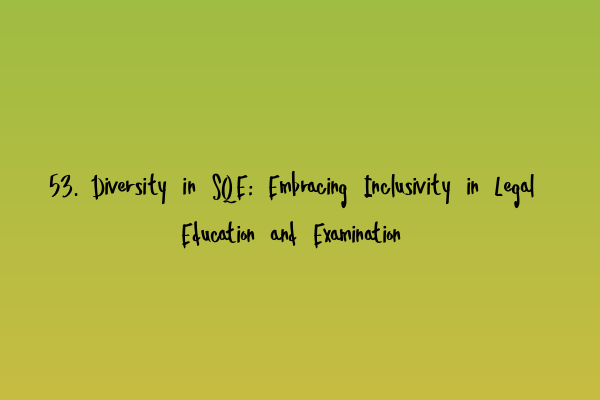Diversity in SQE: Embracing Inclusivity in Legal Education and Examination
Law is a profession that prides itself on being both intellectually rigorous and socially impactful. As the Solicitors Qualifying Examination (SQE) makes its way into the legal education landscape, it is crucial to recognize and address the need for diversity and inclusivity within this new examination framework. In this blog post, we will explore the importance of embracing diversity in legal education and examination and how it can contribute to a more inclusive and representative legal profession.
The Significance of Diversity
Diversity is not just a buzzword; it is a fundamental principle that ensures equal opportunity and fairness for all individuals. In the context of the SQE, diversity encompasses various dimensions, including race, ethnicity, gender, socioeconomic background, disability, and LGBTQ+ status. Embracing diversity in legal education and examination is not only the right thing to do but also the smart thing to do.
Research has consistently shown that diverse teams perform better, generate innovative ideas, and provide more effective solutions. By fostering diversity within the legal profession through the SQE, we can tap into the vast talent pool that exists across different communities, backgrounds, and identities. This not only benefits the individual candidates but also enriches the legal profession as a whole.
Breaking Barriers through Inclusivity
Inclusivity goes hand in hand with diversity, as it ensures that everyone has an equal voice and opportunity to succeed. When it comes to legal education and examination, inclusivity can be fostered in various ways:
- Accessibility: Making legal education and examination accessible to all individuals, regardless of their physical abilities or disabilities, is of utmost importance. This includes providing appropriate accommodations, such as accessible exam venues and materials, and ensuring that individuals with disabilities have equal access to the necessary resources.
- Representation: The legal profession should reflect the diverse society it serves. By actively encouraging and supporting candidates from underrepresented backgrounds, including racial and ethnic minorities, women, LGBTQ+ individuals, and those from disadvantaged socioeconomic backgrounds, we can ensure that the legal profession becomes more representative.
- Supportive Environment: Creating a supportive and inclusive environment within legal education and examination is crucial. This involves establishing clear mechanisms for reporting and addressing discrimination and creating spaces where all individuals feel safe and respected.
By implementing these measures, the SQE can help break down barriers that have traditionally hindered individuals from diverse backgrounds from entering and succeeding in the legal profession.
Integrating Diversity into the SQE
The SQE has the potential to be a catalyst for change, driving diversity and inclusivity within legal education and examination. Here are some suggested strategies to integrate diversity into the SQE:
- Inclusive Learning Materials: Developing materials that reflect diverse backgrounds, experiences, and perspectives can help candidates from all backgrounds feel included and represented in the examination process.
- Expanded Mentorship Programs: Creating mentorship programs that specifically support candidates from underrepresented backgrounds can provide invaluable guidance and support in navigating the legal education and examination journey.
- Training for Examiners: Providing ongoing training for examiners to ensure they are aware of bias and equipped to evaluate candidates in a fair and objective manner can contribute to a more inclusive examination process.
- Collaboration with Diversity Organizations: Partnering with diversity organizations and initiatives can foster collaboration and bring diverse perspectives and expertise into the SQE development process.
By actively incorporating these strategies, the SQE can take a proactive role in promoting diversity and inclusivity within the legal profession, making it more accessible and representative for all aspiring solicitors.
A Call to Action
As legal professionals and advocates for justice, it is our collective responsibility to champion diversity, inclusivity, and social equality. By embracing diversity in legal education and examination through the SQE, we can create a profession that reflects the society it serves and breaks down barriers that have historically existed.
If you’re preparing for the SQE, check out these related articles to enhance your exam preparation:
- Conquer the Multiple Choice Questions (MCQ) in SQE1
- Mastering Effective Revision Techniques for SQE Success
- Interactive mock tests for SQE: Enhancing engagement and learning
- SQE Sample Papers: Practice for Exam Success
- Focus Areas in SQE1 and SQE2: Mastering Key Concepts
Together, let’s create a legal profession that celebrates and values diversity, ensuring a future that is inclusive, representative, and just.
